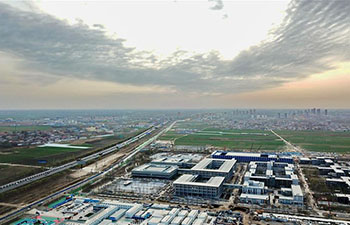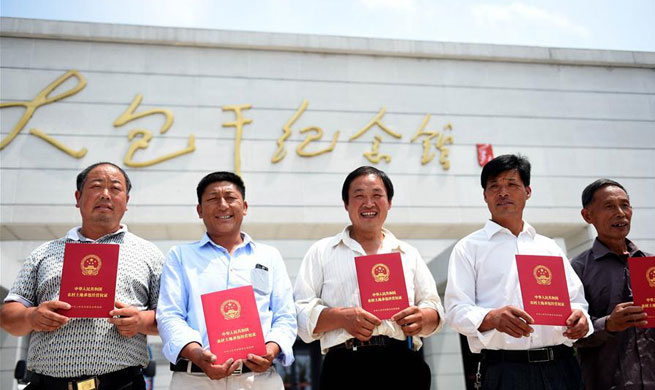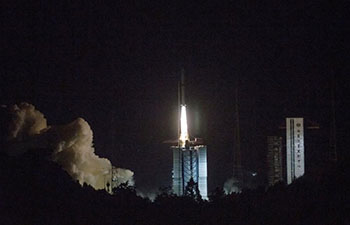SHANGHAI, May 23 (Xinhua) -- Durian, a tropical fruit famous for its spiky shell and pungent smell, is winning the hearts of Chinese consumers and bringing profits to planters in Southeast Asia.
At the recent 2018 Shanghai Thai Festival, Chinese foodies were given four types of Thai durians to test their preferences in flavor, smell and appearance.
Thanks to the popularity of durians in China, Thailand plans to introduce more varieties of the fruit to the Chinese market this year, said Aschariya Juntaravong, Consul of the Agriculture Section of Thailand's Consulate-General in Shanghai.
Thailand produces four main durian varieties. The Monthong, widely known as the "golden pillow," is the most popular variety available on the Chinese market, according to Juntaravong, who added that Chinese consumers are eager to try out more flavors.
The festival attracted more than 50 exhibitors. Besides fresh durian fruit, products such as durian cakes and durian coffee also received a warm response.
"Durian tastes best when it's just ripe. Unripe durians have an astringent taste, while over-ripe ones get bitter and give off a wine smell," said Mr. Li, a durian-lover in Shanghai.
Despite its intimidating hard shell, the stinky fruit is highly sensitive to temperature and has strict requirements for transportation.
In temperatures exceeding 30 degrees Celsius, 5 to 10 percent of durians will go bad when exposed to the sun for two hours. Even at a stable temperature of 13 degrees Celsius, a durian can only keep fresh for 10 days.
Thai and Chinese businesses have come up with special delivery services to keep durian fans happy. Some have arranged charter trains or flights to ship the fruit, while others have set up warehouses and use cold-chain transportation so durians can arrive in China within 120 hours after harvest.
Benefiting from preferential trade policies and ever-closer trade collaboration, Thailand's durian exports to China have surged over the past decade. China is now Thailand's largest durian importer, which also benefits Thai durian planters.
Banya has been growing durians in Thailand for 30 years. He said his income grew by three times over the past decade since cooperating with Chinese traders. He now sells 4 million Thai baht (124,000 U.S. dollars) worth of durian to China every year.
"A pair of pickers can pick 5,000 kilograms of durians a day at peak season, which means one can make about 9,300 U.S. dollars a month," he said. "We are cooperating well with Chinese businessmen. They have created job opportunities for locals and increased our income. We hope more Chinese entrepreneurs will come and bring more Thai fruit to China."
Businesses in Thailand are also learning from e-commerce practitioners in China to help farmers sell more products.
In April, Jack Ma, founder of Alibaba, showed how his e-commerce platform Tmall had sold 80,000 golden pillow durians within one minute during a visit to Thailand.
Alibaba has signed a durian deal with the Thai government worth 3 billion yuan (478 million U.S. dollars) over the next three years. The company also pledged to assist Thai agriculture businesses to send more products, including Thai rice, coconuts, passionfruit and mangosteen, to tap the Chinese market, which has shown huge growth potential for imported agricultural products.
Data from the General Administration of Customs showed China's imports of agricultural products exceeded 120 billion U.S. dollars last year, 12 percent higher than the previous year. From 2008 to 2017, the compound annual growth rate of agricultural product imports reached 8.8 percent.

















